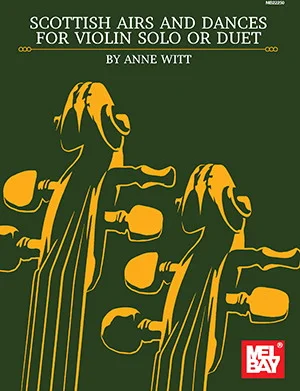Scottish Airs and Dances for Violin Solo or Duet


Price: $16.99
Qty: 2+ Price: $14.87 each
Ships FREE within 1-2 Days
In Stock
Financing Available: Learn More
Product Description
The twenty-five pieces in this collection date back to eighteenth and nineteenth century Scotland. Music was passed around among professional and amateur musicians, hand copied, and ended up in slightly different versions in many collections. The Airs were originally songs or for solo violin. The Dances - strathspeys, reels, jigs, a hornpipe, and the sword dance - were originally for fiddle or bagpipe. The book is arranged as a program from beginning to end - from sunrise, with "Ossian's Hymn to the Sun," to sunset, with the lullaby "O, Can Ye Sew Cushions." And no Scottish evening is complete without "Auld Lang Syne" as a finale. But one can, of course, choose to play a selection.
Three of the airs are Gaelic songs. Others are tunes for which Robert Burns and other poets wrote lyrics. Two airs were composed for the violin - "Neil Gow's Lament for the Death of His Second Wife" and the anonymous "Killiecrankie." The dances were played by fiddlers or pipers. They played (and still play) many of the same pieces. One example is "Gillie Callum," the sword dance. Originally a bagpipe tune, its range was expanded beyond the pipes' nine notes and it became a fiddle tune.
The composers are anonymous except for pieces by Niel Gow (1727-1807), his son, Nathaniel Gow (1763-1831) and William Marshall (1748-1833). Niel Gow was the preeminent violinist of his day. All three composed many fiddle tunes for Scottish country dancing.
Most of the pieces are presented in sets of two, and they should be played without stopping in-between, as they would be performed at a country dance. Metronome markings are given as a guideline. Guitar chords are included ad libitum. Since the first violin generally has the melody, the pieces can also be played by solo violin.
The music of Scotland is unique. The airs have their own special beauty. The dances are fun to play, with lively tempos, dotted rhythms and sudden key changes. This music has long been the pleasure of country fiddlers and pipers. These new arrangements for two violins are perfect for student and teacher as well as violin colleagues.
Three of the airs are Gaelic songs. Others are tunes for which Robert Burns and other poets wrote lyrics. Two airs were composed for the violin - "Neil Gow's Lament for the Death of His Second Wife" and the anonymous "Killiecrankie." The dances were played by fiddlers or pipers. They played (and still play) many of the same pieces. One example is "Gillie Callum," the sword dance. Originally a bagpipe tune, its range was expanded beyond the pipes' nine notes and it became a fiddle tune.
The composers are anonymous except for pieces by Niel Gow (1727-1807), his son, Nathaniel Gow (1763-1831) and William Marshall (1748-1833). Niel Gow was the preeminent violinist of his day. All three composed many fiddle tunes for Scottish country dancing.
Most of the pieces are presented in sets of two, and they should be played without stopping in-between, as they would be performed at a country dance. Metronome markings are given as a guideline. Guitar chords are included ad libitum. Since the first violin generally has the melody, the pieces can also be played by solo violin.
The music of Scotland is unique. The airs have their own special beauty. The dances are fun to play, with lively tempos, dotted rhythms and sudden key changes. This music has long been the pleasure of country fiddlers and pipers. These new arrangements for two violins are perfect for student and teacher as well as violin colleagues.
Product Features
- Author: by Anne Witt
- Format: Book
- SkillLevel: Beginning-Intermediate
- NumberofPages: 32
- PublicationDate: 06_28_2011
- ProductionSize: 8.75 x 11.75
- Category: Violin-Fiddle-Style-Scottish-Solos, Duets & Ensembles-Alternative Styles-Duets and Ensembles-Solos--